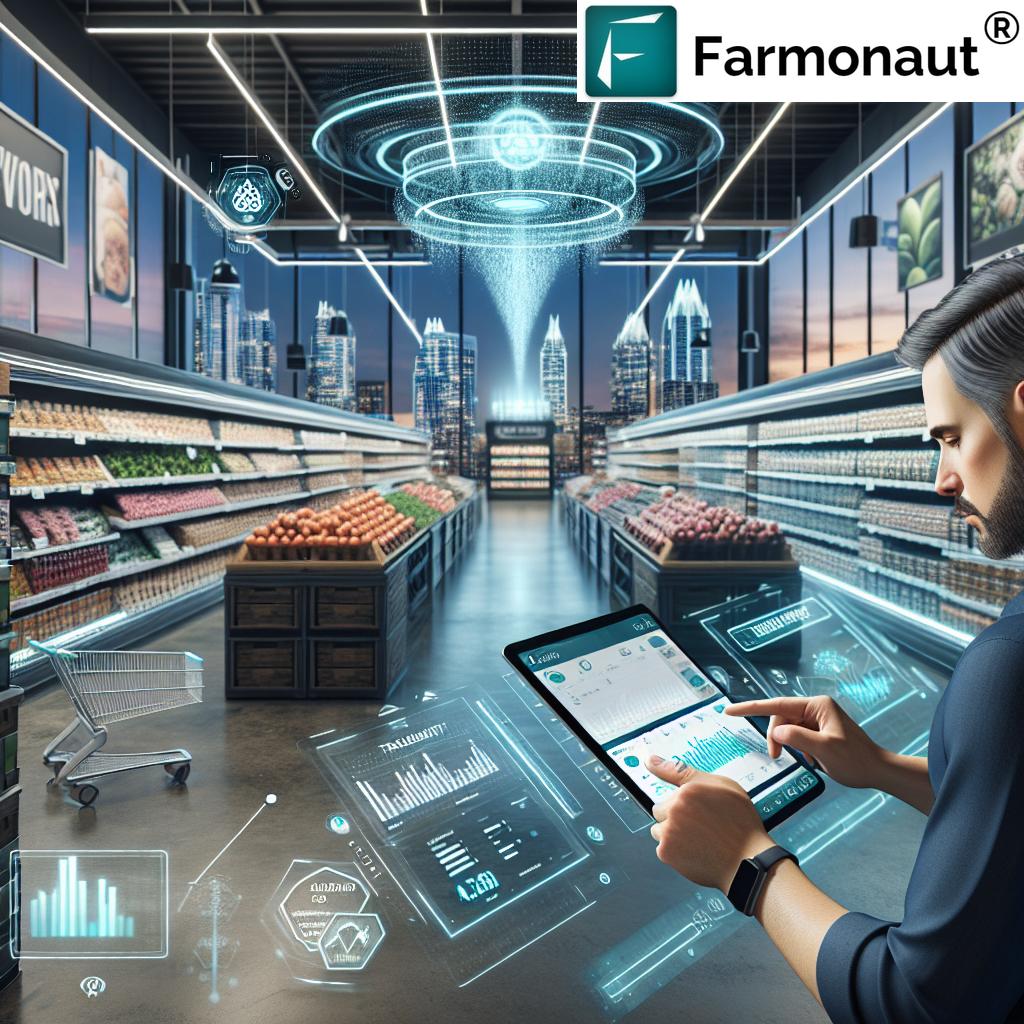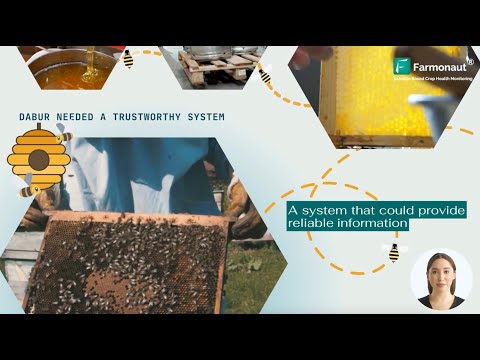Revolutionizing Food Traceability: How Farmonaut’s Tech Solution Enhances Supply Chain Efficiency in Salt Lake City and Austin
“The world’s largest food traceability network partners with a retail operations platform to revolutionize supply chain efficiency.”
In the ever-evolving landscape of food retail, we are witnessing a revolutionary transformation in how supply chains are managed and monitored. At the heart of this change lies the critical need for enhanced food traceability solutions and efficient supply chain data management. As we delve into this topic, we’ll explore how innovative technologies are reshaping the industry, with a particular focus on developments in Salt Lake City and Austin, Texas.
The Dawn of a New Era in Food Traceability
The food retail industry is on the cusp of a significant transformation, driven by the pressing need for more transparent, efficient, and safe supply chains. At the forefront of this revolution is the integration of advanced technologies that promise to redefine how we track and manage food products from farm to table.
In Salt Lake City and Austin, two vibrant hubs of innovation, we’re seeing the emergence of cutting-edge solutions that address long-standing challenges in the food supply chain. These solutions are not just technological marvels; they’re answering critical needs in food safety, regulatory compliance, and operational efficiency.

Understanding the Need for Advanced Traceability
Before we dive deeper into the technological advancements, it’s crucial to understand why food traceability has become such a pressing issue in today’s retail environment:
- Food Safety: With increasing concerns about foodborne illnesses, being able to quickly trace and isolate contaminated products is paramount.
- Regulatory Compliance: New regulations, such as the FSMA 204, are mandating more stringent traceability measures.
- Consumer Trust: Today’s consumers demand transparency and want to know where their food comes from.
- Operational Efficiency: Improved traceability can lead to significant reductions in waste and operational costs.
In light of these factors, the industry has been calling for solutions that can address these needs comprehensively. This is where innovative companies like Farmonaut come into play, offering advanced technologies that promise to revolutionize the food supply chain.
Farmonaut: Pioneering Food Traceability Solutions
At the forefront of this technological revolution is Farmonaut, a company that has been making waves in the agricultural technology sector. Farmonaut’s innovative approach to food traceability and supply chain management is particularly relevant to our discussion about developments in Salt Lake City and Austin.
Farmonaut offers a suite of advanced, satellite-based farm management solutions that are accessible via Android, iOS, web/browser apps, and API. Their mission aligns perfectly with the industry’s current needs: making precision agriculture affordable and accessible to farmers worldwide.
Let’s explore some of the key technologies that Farmonaut brings to the table:
- Satellite-Based Crop Health Monitoring: Using multispectral satellite images, Farmonaut provides real-time insights into crop health, soil moisture levels, and other critical metrics.
- Jeevn AI Advisory System: This AI-driven tool delivers personalized farm advice, weather forecasts, and expert crop management strategies.
- Blockchain-Based Product Traceability: Farmonaut’s blockchain integration ensures transparent and secure tracking of products from farm to consumer.
- Fleet and Resource Management: Tools for efficient logistics management help reduce operational costs and optimize vehicle usage.
- Carbon Footprinting: Real-time data on emissions allows businesses to monitor and reduce their environmental impact.
These technologies are not just theoretical concepts; they’re being implemented and making a real difference in places like Salt Lake City and Austin, where food retailers and suppliers are constantly looking for ways to improve their operations.
The Impact on Salt Lake City and Austin’s Food Retail Sector
In Salt Lake City and Austin, the implementation of advanced food traceability solutions is having a profound impact on the local food retail industry. Here’s how:
- Enhanced Food Safety: With Farmonaut’s real-time monitoring and blockchain-based traceability, retailers in these cities can quickly identify and isolate potential food safety issues, protecting consumers and minimizing the impact of recalls.
- Streamlined Compliance: As regulatory requirements become more stringent, especially with the approaching FSMA 204 mandate, Salt Lake City and Austin retailers are finding it easier to stay compliant using integrated traceability systems.
- Improved Supplier-Retailer Communication: The centralization of data has led to better communication between suppliers and retailers, reducing misunderstandings and improving overall supply chain efficiency.
- Waste Reduction: By having a clearer picture of their supply chain, retailers in these cities are better able to manage inventory, reducing waste and associated costs.
- Consumer Trust: With the ability to provide detailed information about product origins and journey, retailers are building stronger relationships with increasingly conscious consumers.
“FSMA 204 compliance and operational efficiency in food retail are addressed through an innovative end-to-end traceability system.”
The Technology Behind the Revolution
To truly appreciate the impact of these advancements, it’s important to understand the underlying technologies driving this revolution in food traceability:
- Satellite Imagery: Companies like Farmonaut use advanced satellite technology to monitor crops and environmental conditions in real-time.
- Artificial Intelligence and Machine Learning: These technologies power predictive analytics and personalized advisory systems, helping farmers and retailers make data-driven decisions.
- Blockchain: By creating an immutable record of each step in the supply chain, blockchain technology ensures transparency and traceability.
- Internet of Things (IoT): Sensors and connected devices throughout the supply chain provide real-time data on product conditions and location.
- Cloud Computing: Cloud-based platforms allow for the centralization and easy access of vast amounts of supply chain data.
The integration of these technologies is creating a more connected, transparent, and efficient food supply chain in Salt Lake City, Austin, and beyond.

Comparing Traditional Methods with New Integrated Solutions
To better understand the transformative nature of these new traceability solutions, let’s compare them with traditional methods:
| Features | Traditional Methods | New Integrated Solution | Benefits to Retailers |
|---|---|---|---|
| Data Centralization | Fragmented data across multiple systems | ✓ Centralized data platform | Improved data accessibility and decision-making |
| FSMA 204 Compliance | Manual tracking and reporting | ✓ Automated compliance tracking | Reduced compliance-related workload and risk |
| Supplier-Retailer Communication | Often fragmented and delayed | ✓ Real-time, integrated communication | Faster problem resolution and improved collaboration |
| Real-time Data Availability | Limited or delayed data access | ✓ Instant access to up-to-date information | Quicker response to issues and market changes |
| Invoice Discrepancy Resolution | Time-consuming manual checks | ✓ Automated reconciliation | Reduced administrative costs and errors |
| Waste Reduction Capabilities | Limited visibility into inventory and expiration | ✓ Predictive analytics for inventory management | Significant reduction in food waste and associated costs |
| Food Safety Protocol Implementation | Reactive approach to safety issues | ✓ Proactive monitoring and alerts | Enhanced food safety and reduced recall risks |
| Efficiency Improvement | Minimal | Up to 30% reduction in compliance-related tasks | Significant time and cost savings |
As we can see from this comparison, the new integrated solutions offer significant advantages over traditional methods, particularly in areas of efficiency, compliance, and safety.
The Role of Farmonaut in Enhancing Supply Chain Efficiency
Farmonaut’s contribution to this technological revolution is significant. Their platform offers a comprehensive suite of tools that address many of the challenges faced by the food retail industry in Salt Lake City and Austin:
- Real-time Crop Monitoring: Farmonaut’s satellite-based monitoring system provides invaluable data on crop health and environmental conditions, allowing for more precise supply chain planning.
- AI-Powered Insights: The Jeevn AI system offers personalized advice that can help optimize production and reduce waste throughout the supply chain.
- Blockchain Traceability: By implementing blockchain technology, Farmonaut ensures that every step of the product journey is recorded and verifiable, enhancing trust and transparency.
- Resource Optimization: Tools for fleet and resource management help retailers and suppliers in Salt Lake City and Austin to streamline their operations and reduce costs.
- Sustainability Tracking: With increasing focus on environmental impact, Farmonaut’s carbon footprinting feature allows businesses to monitor and improve their sustainability practices.
These features collectively contribute to a more efficient, transparent, and sustainable food supply chain in the Salt Lake City and Austin regions.
Addressing FSMA 204 Compliance
One of the most pressing concerns for food retailers and suppliers in Salt Lake City and Austin is compliance with the upcoming FSMA 204 regulation. This mandate, set to take effect on January 20, 2026, requires enhanced traceability measures for certain food products.
Farmonaut’s traceability solutions are particularly well-suited to address these compliance requirements:
- Detailed Record-Keeping: The platform allows for the capture and storage of critical tracking events (CTEs) and key data elements (KDEs) as required by FSMA 204.
- Quick Retrieval: In the event of a food safety issue, Farmonaut’s system enables rapid access to relevant traceability information, meeting the 24-hour deadline set by the FDA.
- End-to-End Visibility: By tracking products from farm to retail, the system provides the comprehensive view needed for full compliance.
- Data Integrity: The use of blockchain technology ensures that traceability data is tamper-proof and reliable.
By implementing these features, retailers and suppliers in Salt Lake City and Austin can not only meet regulatory requirements but also improve their overall operations and build consumer trust.
The Future of Food Traceability in Salt Lake City and Austin
As we look to the future, it’s clear that the food traceability landscape in Salt Lake City and Austin will continue to evolve. Here are some trends we expect to see:
- Increased Adoption of AI and Machine Learning: These technologies will play an even larger role in predicting supply chain disruptions and optimizing operations.
- Greater Integration of IoT Devices: More sensors and smart devices throughout the supply chain will provide even more detailed data on product conditions and movement.
- Enhanced Consumer Engagement: Traceability data will be increasingly used to provide consumers with detailed information about their food, possibly through QR codes or mobile apps.
- Expansion of Blockchain Usage: As the technology matures, we expect to see wider adoption of blockchain for ensuring data integrity and transparency.
- Focus on Sustainability: Traceability solutions will increasingly be used to monitor and improve the environmental impact of food supply chains.
Companies like Farmonaut are at the forefront of these developments, continuously innovating to meet the evolving needs of the industry.
Overcoming Implementation Challenges
While the benefits of advanced traceability solutions are clear, implementing these systems in Salt Lake City and Austin’s food retail sector is not without challenges. Some of the hurdles include:
- Legacy System Integration: Many retailers and suppliers are still using older systems that may not easily integrate with new technologies.
- Cost Concerns: The initial investment in new traceability systems can be significant, especially for smaller businesses.
- Training and Adoption: Ensuring that all staff are properly trained and comfortable with new systems can be time-consuming.
- Data Privacy and Security: With increased data collection and sharing, ensuring the security and privacy of sensitive information is crucial.
However, companies like Farmonaut are addressing these challenges by offering scalable solutions, providing comprehensive training and support, and prioritizing data security in their systems.
The Role of Partnerships in Advancing Traceability
The advancement of food traceability solutions in Salt Lake City and Austin is not happening in isolation. It’s the result of collaboration between various stakeholders in the food industry. While we’re not discussing any specific partnerships, it’s important to note that the integration of different technologies and expertise is crucial for creating comprehensive traceability solutions.
These collaborations often bring together:
- Technology providers like Farmonaut
- Retailers and suppliers
- Regulatory bodies
- Research institutions
By working together, these entities can create solutions that are not only technologically advanced but also practical and compliant with industry standards and regulations.
The Impact on Consumers in Salt Lake City and Austin
Ultimately, the advancements in food traceability have a significant impact on consumers in Salt Lake City and Austin. Here’s how they benefit:
- Enhanced Food Safety: With better traceability, foodborne illness outbreaks can be quickly contained, protecting public health.
- Increased Transparency: Consumers can access detailed information about where their food comes from and how it was produced.
- Support for Local Producers: Traceability systems can highlight local food sources, supporting the farm-to-table movement in these cities.
- Reduced Food Waste: More efficient supply chains mean less food is wasted, potentially leading to lower prices and more sustainable practices.
- Allergen Management: Improved traceability allows for better management of allergens throughout the supply chain, protecting sensitive consumers.
As these systems become more prevalent, consumers in Salt Lake City and Austin can expect to see a food retail environment that is safer, more transparent, and more aligned with their values.
Conclusion: A New Era of Food Retail in Salt Lake City and Austin
The revolution in food traceability, driven by companies like Farmonaut and others in the industry, is ushering in a new era for food retail in Salt Lake City and Austin. By leveraging advanced technologies such as satellite imaging, AI, blockchain, and IoT, these solutions are addressing critical challenges in food safety, regulatory compliance, and operational efficiency.
As we look to the future, it’s clear that these advancements will continue to shape the food retail landscape in these cities and beyond. Retailers and suppliers who embrace these technologies will be better positioned to meet regulatory requirements, improve their operations, and build trust with increasingly conscious consumers.
The journey towards full supply chain transparency and efficiency is ongoing, but with the innovative solutions being developed and implemented today, the future of food retail in Salt Lake City and Austin looks brighter and safer than ever before.
FAQs
- What is FSMA 204 and why is it important?
FSMA 204 is a regulation under the Food Safety Modernization Act that mandates enhanced traceability measures for certain food products. It’s important because it aims to improve food safety and reduce the impact of potential recalls. - How does Farmonaut’s technology improve food traceability?
Farmonaut uses satellite imaging, AI, and blockchain technology to provide real-time monitoring of crops, ensure transparent product tracking, and offer data-driven insights for better supply chain management. - What are the benefits of implementing advanced traceability solutions for retailers in Salt Lake City and Austin?
Benefits include improved food safety, easier regulatory compliance, better supplier-retailer communication, reduced waste, and increased consumer trust. - How does blockchain technology enhance food traceability?
Blockchain creates an immutable record of each step in the supply chain, ensuring transparency and making it easier to trace products back to their source. - What challenges might retailers face when implementing new traceability systems?
Challenges can include integration with legacy systems, initial costs, staff training, and ensuring data privacy and security.
Earn With Farmonaut: Earn 20% recurring commission with Farmonaut’s affiliate program by sharing your promo code and helping farmers save 10%. Onboard 10 Elite farmers monthly to earn a minimum of $148,000 annually—start now and grow your income!
For more information about Farmonaut’s innovative solutions, visit their web app or check out their API. You can also find Farmonaut on Google Play and the App Store.



